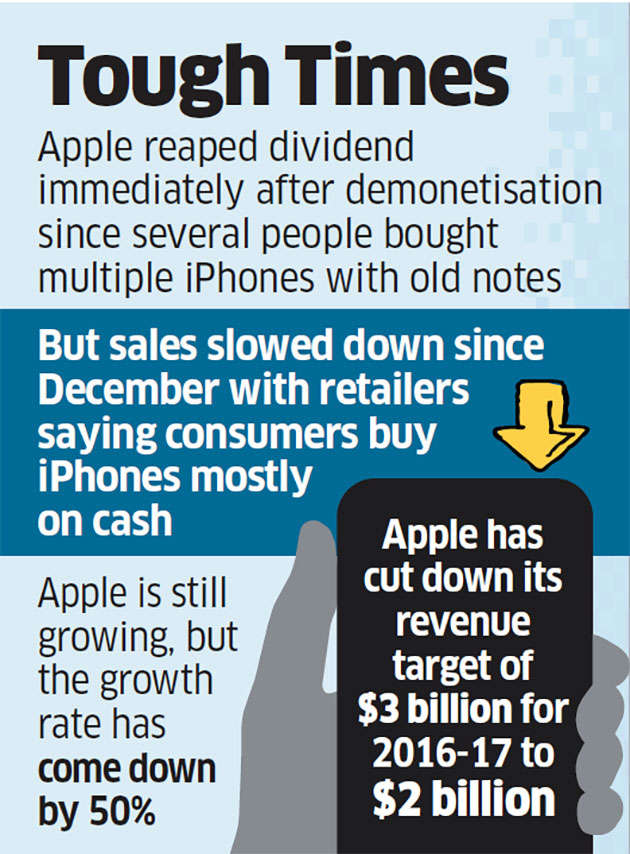 Apple’s iPhones are the latest casualty of demonetisation, which has put the company’s revenue and sales targets in jeopardy.
Apple’s iPhones are the latest casualty of demonetisation, which has put the company’s revenue and sales targets in jeopardy.After a cracker of sales in October-November, which heralded strong growth for that quarter, purchases of iPhones dwindled mainly because of the lack of cash, which had fuelled buying before demonetisation.
That’s forced Apple to scale down its India revenue target to $2 billion for its fiscal year (October 2016-September 2017) from $3 billion.
More than 80% of iPhone sales in India – through online platforms and retail stores – were led by cash transactions, which virtually disappeared from December, according to two senior industry executives.
As a result, the target of selling 3 million iPhones this fiscal year, set by Apple CEO Tim Cook during his India visit in May 2016, is unlikely to be achieved, they said.

According to estimates by market experts, Apple, based in Cupertino, California, shipped in 800,000 to 900,000 iPhones to India in the October-December quarter. Smartphone sales have fallen 30-35% since demonetisation, pulling down Apple’s growth rate by 50%, retailers said.
“There is huge pressure on driving sales numbers, which is why there has been a never-before-seen flurry to launch consumer offers to push iPhone sales – be it bundling, cashback or buyback. However, this has pushed up the cost of selling, impacting the profit margin,” said one of the executives.
The sales drop adds urgency to Apple’s plans to start making iPhones in India and offer them through its own stores, apart from selling refurbished devices, in a bid to boost revenue from the country.
Apple declined to comment on the developments. The government scrapped high-denomination currency notes in November to combat unaccounted money. It also imposed curbs on cash withdrawals from banks and ATMs as it introduced new currency notes, forcing people to curb spending.
The chief of a leading mobile phone retail chain said iPhone sales have been primarily cash-driven purchases, most often bought with unaccounted money.
“Even after the government eases up the cash withdrawal limit in March, it will take a few more months for the situation to be back to pre-demonetisation days. And then Samsung’s next flagship will be launched, which will further impact iPhone sales,” he said.
Apple posted record revenue in India in the October-December quarter, although demonetisation is “still definitely having some overhang”, Cook said during an earnings call this month.
ET had earlier reported record sales of iPhone 7 and 7 Plus in October due to the novelty factor, absence of rival Samsung’s Galaxy Note 7 and a brief period of record sales immediately after demonetisation in November when consumers rushed to buy iPhones to use up their old currency notes.
Apple posted sales of Rs 9,997 crore ($1.5 billion) in the fiscal year to March 2016, growing 54% from the year before. About 75% of Apple’s revenue is generated from iPhone sales, of which almost 45% comes in the October-December quarter due to the launch of new handsets and the festive season shopping.
Project Everest
One executive said Apple’s focus on manufacturing in India is to push revenue in the country since the company’s lofty plans haven’t been fulfilled. Apple India launched an ambitious ‘Project Everest’ in 2013-14 to sell 10 million iPhones in India by 2016-2017, which remains a far cry. This project, developed with Boston Consulting Group, was aimed at expanding distribution to reach the 10 million sales figure.
“Apple has realised that if it has to grow in India like in China, it would require both refurbished handsets since it can price them aggressively with company warranty terms, and also its own Apple Stores to redefine the entire selling and brand experience. Hence, by setting up local manufacturing, it will be able to start Apple retail and also expects government to then become sensitive to its refurbished handset selling plans,” said one executive.
The government has not allowed Apple to sell refurbished handsets on concerns of e-waste and its impact on the ‘Make in India’ programme. The company has made a fresh pitch to the government to start selling such handsets.


0 comments:
Post a Comment